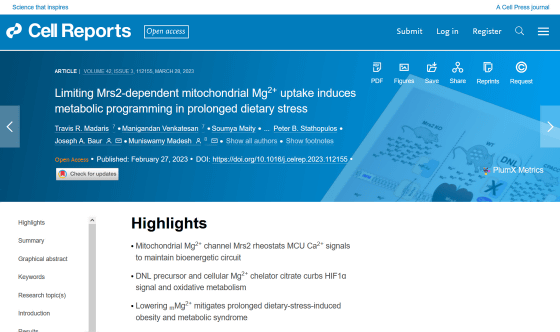`` Medicine that does not gain weight even if you keep eating junk food '' is developed

Junk food, which is rich in fat and sugar, is very delicious, but if you keep eating it, you will have problems such as becoming obese and unhealthy. Therefore, a research team at the University of Texas San Antonio Health Science Center in the United States announced that it has developed a ``drug that does not gain weight even if you continue to eat junk food''. Mice given the drug, dubbed CPACC , had no problems with weight gain or liver abnormalities, despite being fed a high-fat, high-sugar diet for most of their lives. That's it.
Limiting Mrs2-dependent mitochondrial Mg2+ uptake induces metabolic programming in prolonged dietary stress: Cell Reports
https://doi.org/10.1016/j.celrep.2023.112155

Scientists Develop Drug That Prevents Weight Gain in Junk-Food-Eating Mice : ScienceAlert
https://www.sciencealert.com/scientists-develop-drug-that-prevents-weight-gain-in-junk-food-eating-mice
In human cells, mitochondria , one of the organelles, use electrons and oxygen molecules to produce adenosine triphosphate (ATP) , which is also described as the 'energy currency of living organisms', along with water and It releases carbon dioxide and heat energy. You can understand the energy production in the body of living things by reading the following article.
How do organisms produce the 'energy' they use for their activities? -GIGAZINE

The research team has been investigating how magnesium , a mineral necessary for the human body, affects intracellular energy metabolism. Magnesium is the fourth most abundant cation in the body, after calcium, potassium, and sodium.
However, too much magnesium in the body slows down the production of energy in the mitochondria, the powerhouses of the cell. 'It just puts the brakes on and slows you down,' says PhD student Travis Madaris, co-lead author of the paper.
The research team found that mice lacking the gene MRS2 , which promotes magnesium transport to mitochondria, have more efficient sugar and fat metabolism in mitochondria. Therefore, the research team continued to feed high-fat, high-sugar, high-calorie junk food to mice lacking MRS2 and normal mice for a long period of time, and conducted an experiment to see what effect it had on the body. .
Experiments showed that mice lacking MRS2 remained leaner and healthier, with improved mitochondrial metabolism of sugar and fat, despite eating junk food from 14 weeks of age up to a year. It turns out that you can. In addition, there was no evidence of fatty liver due to obesity or type 2 diabetes in these mice.

Based on the research results that the lack of MRS2 affects mitochondrial energy metabolism, the research team developed a drug called `` CPACC '' that has the same effect as the lack of MRS2. In fact, the research team reported that experiments in which mice were given CPASS and continued to eat junk food had the same effect as mice lacking MRS2.
Postdoctoral fellow Manigandan Venkatesan, a co-author of the paper, commented, ``Reducing mitochondrial magnesium levels mitigated the negative effects of long-term dietary stress.''
The research team has already filed a patent application for CPACC, but the effects seen in mice are not necessarily reproduced in humans, and how the lack of MRS2 affects the metabolic regulation of the human body. should also be investigated.
Madesh Muniswamy, a professor of medicine who led the research team, said: 'These findings are the result of several years of work. They may reduce the risk of cardiometabolic diseases such as heart attack and stroke, and may follow fatty liver disease. A drug that can reduce the incidence of liver cancer in some people will have a huge impact and we will continue to develop it.'

Related Posts:
in Science, Posted by log1h_ik







